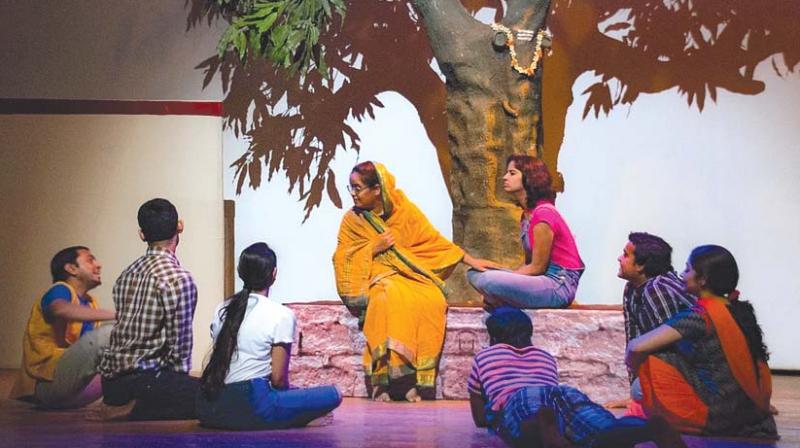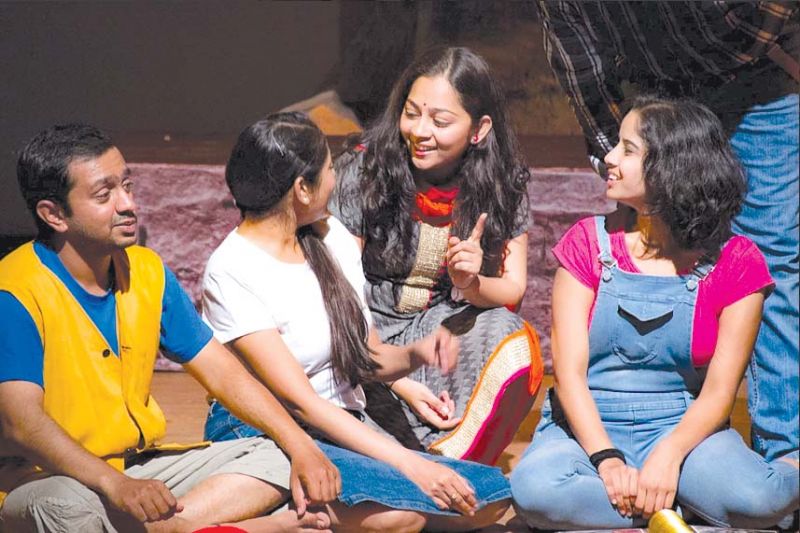The Mango searchers

Often we are so focused on the idea of a developed future that we appear blind towards the risk of absolutely disrupting the environment. Buildings and bridges may narrow distances but is it really really a step forward towards urbanisation if it is at the cost of losing the authentic charm and glory of a place. Driven by this idea in mind and mingled with just the right about of nostalgia is Ranga Sourabha’s theatrical venture, Maavina Gudi Colony.
The plot revolves around a group of seven friends; these young adults plan to meet at a place where they had spent their childhood, called ‘Mavinagudi Colony’ (Mango Temple Colony). As the name itself suggests, a mango tree is the focal point, and the very tree is now on the verge of being destroyed for the development of the area.
 A scene from the play
A scene from the play
Archana Bharadwaj, who plays the role of Jamuna explains how each character has the potential to firmly resonate the inherent feelings of everyone in the audience. “There are characters from all walks of life and it is their nostalgic connection that holds and binds the play together. As for Jamuna, she symbolises the reality of dreams not coming true all the time. The aspiring actress grows up to be a young mother with a family, and she’s sad about it, definitely — but the striking thing about her is how her liveliness is still intact. She is still the caring, nurturing one who likes to see people happy,” she explains.
Another amusing character from the story is Subbu, played by Gotham Upadhya. “He is the quintessential slow kid from the group. His father is the local priest, and somehow Subbu grows up to be depressed and lonely, having achieved none of his goals. Yet he is adored within his group,” laughs Upadhya trying to sketch his character. “He is an excellent means to reconnect with one’s childhood, however. His innocence and naivete remains intact throughout, something that helps audiences recollect the tiniest elements from their own past,” he adds.
As the story unfolds, diversities are seen in the form of the character of Azar, who happens to be from the only Muslim family in the colony. Shashank, the actor playing him, says, “He grew up amidst communal harmony, which is why his nostalgia carries an element of his own surprise upon realising how he was never the subject of racial discrimination. However, he grows up to be a rock climber and is well-settled in life, and infuses the sense of practicality among the group of seven friends. He is a driven character and has no time for emotion.”
The fact that there’s a stark contrast between each character along with the apolitical approach towards symbolising the various aspects of nostalgia, and the repercussions of globalisation are not lost on the audience. “Our implications are subtle, as being a common man, there’s not much you can do against government protocols. Yet, we have tried to portray everything realistically with a set incorporating an actual tree for background. Our narrative is nonlinear, but we are going with a no-makeup approach to lay stress completely on facial expressions,” adds director, Shankar Ganesh.
With a script that has undergone improvisations from each character, one can only expect to reunite with just the right amount of personal elements that each character brings into the scenes, and pivoting this idea of unison, the cast and crew are presenting this nostalgic camaraderie.
— The play will be staged on July 15 at 3.30 pm and 7.30 pm at Ranga Shankara.

